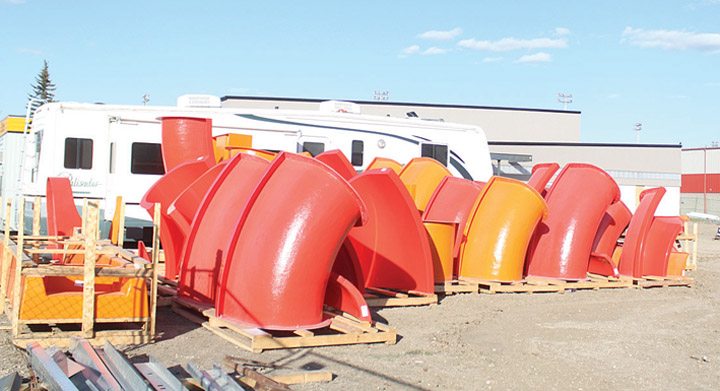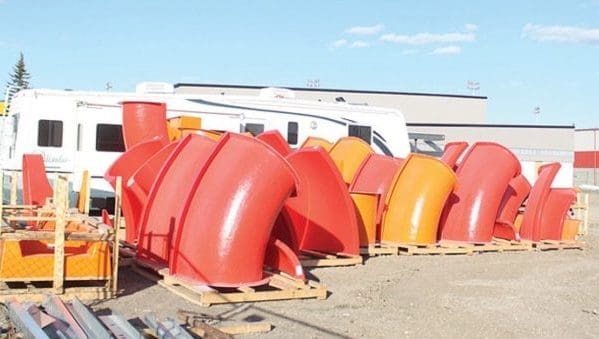
Sections of the water slide for the Kindersley Aquatic Centre are sitting at the construction site while work continues on the facility. Town officials are looking at options to save money on operational costs. One option would use biomass in a boiler system to reduce energy costs for the facility.
Kenneth Brown
of The Clarion
Town officials are looking at options to reduce the operational costs for the new aquatic centre, and a green technology is one option they are considering.
Council held a special meeting on May 7 to address several items. One item on the agenda was a delegation from Eco-Growth Environmental Inc., a Calgary-based technology company with a focus on providing green initiatives and solutions to environmental challenges.
The delegation consisted of Glen Smith, the company’s vice-president of business development, and Scott Kerr, the company’s president. Kerr said he and Smith are both “farm kids” from Saskatchewan, so they are used to places like Kindersley. Smith said he was in town to answer any questions from council.
Mayor Rod Perkins spoke about the aquatic centre project. He told the delegates that the shell of the building is up and the centre’s main pool is pretty much complete, so workers are making progress on the construction.
“We’re just looking at this as an option,” Perkins said about the company’s green technology, recognizing that the YMCA of Regina has been using the technology with its swimming pool and town officials are excited about the potential of using it at the aquatic centre.
[emember_protected for=”2″ custom_msg=’For more on this story, please see the May 9 print edition of The Clarion.’]
Smith, who spoke more often among the two delegates, said the company started as an industrial laundry business cleaning floor mats. He noted that the company has taken green steps to manage its own internal waste over the past 20 years.
The company has found a way to produce energy from the waste it produces and it includes everything from used pallets to dryer lint, he said. The company washes towels contaminated by various solvents and the solvents cannot be washed down the drain, he told council.
Smith said the company found a way to remove the hydrocarbons from the towels before they are washed and the hydrocarbons are used to provide power to a boiler that is used to heat the company’s water for doing laundry.
According to Smith, the City of Calgary has banned food waste from its landfills. The company started to look for alternative materials to create energy, and started to experiment with food waste. The food waste is dried out to create a biomass used to power the company’s boilers, and it is a technology the company is marketing.
The delegate said the biomass will combust in boilers to create energy. He referred to several materials that could be used for biomass including paper products, and crop waste such as flax stubble. Smith said as far as Eco-Growth is concerned, “it’s all biomass to us.”
Councillor Gary Becker asked the company how much money is saved by using the technology at its industrial laundry. He said the town is looking at options to save money, not so much to reduce waste going into the landfill.
Smith said the company operates a 61,000 square-foot laundry and it saves about $61,000 per year by using biomass to power its boilers. There is a cost to the process because it has to be dried in one of the company’s special dehydrators. He said food is 80 per cent water, so the process eliminates the tonnage.
Becker said he is a business owner, so he thinks like a business owner. He asked the delegate if additional labour is required for the process because it would cut into any savings the process is achieving. Smith said the process costs less than taking materials to a landfill.
When asked about costs to the town, Kerr said he would require information from the town to provide a concrete response. The company’s president said he did not want to guess. Council heard that the company uses gasification as part of the process.
Bernie Morton, the town’s chief administrative officer (CAO), said the town is replacing a 40-year-old swimming pool and building a new aquatic centre with no grant funding. The town must also decommission a landfill, he said.
He noted that the town and its partners are building a new landfill and the town is looking at a curbside organics collection program. Officials are looking for technologies to use to complement the projects and to show the federal government that Saskatchewan municipalities are taking steps to reduce their carbon footprint.
The company’s dehydrators range in size from a small chest freezer to units that are three and a half feet tall and 12 feet long, Smith said. He made an additional presentation at the meeting to provide more detail about the equipment and process.
Morton later asked if the system would be able to use stretchable post consumer plastics such as plastic grocery bags as fuel. He said it would be a good solution to a problem because post consumer plastics are not allowed in the recycling stream.
Smith said the plastic would have to spend more time in the combustion chamber, but the company is working on a unit capable of burning plastic to create energy. Kerr said the company has not perfected the technology yet, but it is on the way. Mayor Perkins said the town would keep in touch with the company through its administration.
[/emember_protected]

